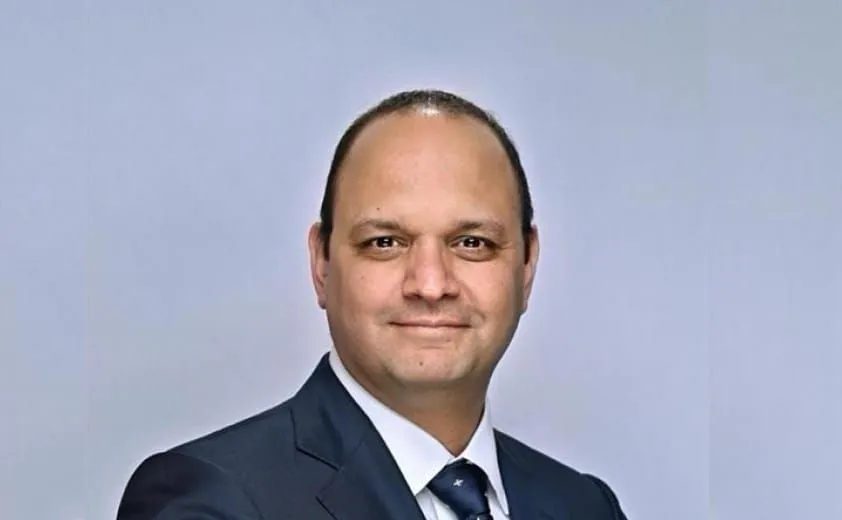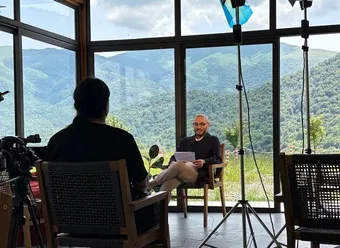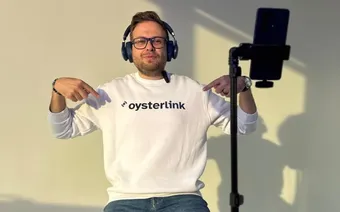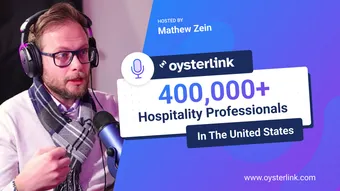Who is Chintan Dadhich?
Chintan Dadhich is a seasoned hospitality leader with over 20 years of experience. Currently, he’s the General Manager of the Conrad New York Downtown, a luxury hotel in the heart of Manhattan. His career spans diverse markets like Boston, Palm Springs, Miami and Las Vegas, each shaping his expertise in leading high-performing teams. Originally from India, where he attended hotel school, Chintan began his career with prestigious brands like Le Meridien and Oberoi Hotels before moving to the U.S.
Now a proud New Yorker for several years, Chintan balances a thriving career with family life.
We spoke with Chintan about his journey in hospitality, what it takes to succeed in the industry, and life as the leader of a top-tier hotel. If you’re curious about building a rewarding career in hospitality, keep reading for insights from one of the best in the business.
Interview tips from a General Manager who hired thousands of candidates
What inspired you to join the hospitality industry?
Chintan Dadhich: I think my calling started because I was exposed to the food and beverage world through my aunt, who actually had a restaurant in the San Francisco Bay Area.
I remember coming to the U.S. for one of my summer holidays and spending time with her. Back then, one of my passions was taking small sailboats out on the water, and my aunt was kind enough to pay for my membership for those three months so I could go sailing.
But in return, her request was that I help her in the restaurant at night—bussing tables or doing side work. That’s how I got exposed to the restaurant world, and it sparked my love for serving people.
Another big influence was my father, who was a decorated officer in the army. Watching how he dealt with people from a leadership perspective made a significant impact on me.
It taught me the importance of treating people the way I want to be treated. That concept wasn’t something I learned in a book; I learned it from my father and have stuck to it throughout my career.
How to inspire young people to join the industry?
Chintan Dadhich: To inspire young people to join the hospitality industry, we need to focus on better communication and understanding their priorities. While guest expectations remain consistent — demanding high-quality products and service — what’s changed is how we attract and retain younger generations like Gen Z and millennials.
Millennials and Gen Z priorities differ from the traditional, old-school hotel approach, where you had to spend a certain number of years in one position before moving forward. Flexibility and work-life balance now play a bigger role in their decision-making.
For instance, when I joined the industry 25 years ago, being the first in the morning and the last to leave at night was seen as a mark of successful leadership. That’s no longer the case.
I’ve learned to empower my team and let them make their own decisions while ensuring I’m accessible when they need help. Accessibility doesn’t mean micromanaging; it means providing flexibility and being available when someone needs guidance.
What are the most important skills you look for when hiring?
Chintan Dadhich: Decision-making. This is extremely important in our industry because every single day we gather a lot of information about people's lives. So, if we’re not acting on this information and making decisions based on it, we’re missing out on opportunities.
Number two: When I make decisions, I run them through two filters. The first is, "Is this the right thing to do for our customers?" If the answer is no, I likely won’t make the decision. The second filter is, "Does this create a positive work environment?" If it doesn’t, I’m not going to do it.
Apart from that, I think some qualities people should have include great listening skills. The ability to pause and think before speaking is crucial. If you can do these things, I'll definitely want you on my team!
How important is mentorship in this line of work?
Chintan Dadhich: Mentorship is extremely important in any career. It’s a very personal relationship, where the mentor guides the mentee towards achieving their goals, both professionally and personally.
A mentor is someone you admire, who can guide you in the right direction and act as a sponsor for your future achievements. They offer true feedback, both good and bad, and challenge you to improve.
Mentors help you step out of your comfort zone and provide insights into your career progression. They don’t make decisions for you but help you weigh the pros and cons to make your own choices.
It's normal to have different mentors at different stages. As you grow, your needs and motivations change, so having a mentor who can guide you through each phase is valuable. The relationship might evolve, but the guidance remains important.
How can young people find a mentor?
Chintan Dadhich: Young people can find mentors in many different settings. A mentor could be someone in your professional or educational network, or it could be a person you meet in a social setting who inspires you.
It’s not always about a one-on-one conversation; it can also come from following figures you admire, such as through books, audiobooks, podcasts, or even leaders in an organization.
The key is to actively listen to their guidance and incorporate it into your life. If you can’t find a mentor right away, it’s okay, but you should continue striving to find that person who challenges and inspires you.
What are your absolute deal breakers when it comes to attending an interview?
Chintan Dadhich: Some of the red flags for me are coming in late. I think that's just disrespectful to other people's time, especially in a day and age when we're moving so fast in our lives for everything that we do.
Now, there are emergencies that will happen sometimes. In that case, having the confidence to postpone the interview and or call in advance is absolutely okay. But I think that transparency is extremely important.
The second thing would be not being a good listener. Because the interview process is a two-way street. So if you're going in an interview only to speak and not listen, you're missing the point, right? So if you're fiddling with your phone or your resume, that's very distracting to me and shows me that you're not intentional about your conversation.
Eye contact, very important. And if it's a panel interview, that's actually an art form, right? To be able to give everybody the attention during that conversation. Being able to have one-on-one conversation with multiple people, that shows to me, actually, your ability to handle multiple things.
How important is a cover letter?
Chintan Dadhich: Personally, I always have a cover letter ready. I've been with the same company for 21 years, so I haven't had to use one, but I keep a template ready in case I need it in the future.
To me, a cover letter is like answering the first question I asked you: Who are you as a person, and why are you applying for this position? It creates curiosity for the employer and gives them a reason to meet with you. A cover letter sparks interest and helps form a connection.
I’d recommend preparing a cover letter, especially if the company asks for it. This way, you’ll be able to reach out to the hiring manager as soon as possible.
What is a realistic timeline to become a manager in hospitality?
Chintan Dadhich: I think there's a couple of things here.
First, it depends on what your personal desires are. If you are looking to be a manager, well, first, you have to be competitive. A hotel is not made of 300 general managers, right? There's one general manager.
To get to that position, it’s extremely important to have the building blocks to get you there. It starts with great education and work experience. However, the experience doesn’t have to be 10 years.
You can show you’re ready for leadership through your current role by showing qualities every day that make others trust you’re the right person for the job.
Some of those qualities include the ability to interact with others from a point of empathy, reading body language, understanding how people react to stress, how they respond to recognition and how they handle stressful situations. These skills are essential for effective leadership.
If people around you don’t naturally gravitate toward you out of respect and a genuine desire to be around you, then you’re not positioning yourself as a leader.
And it’s not about physical attractiveness — it’s about making others want to spend time with you because they feel good about themselves when they’re with you. That’s a great quality in a leader.
What is the most important thing when choosing a job board?
Chintan Dadhich: The most important factor when choosing a job board is ensuring it connects you with candidates who align with your organization's needs and culture. While skills are teachable, personality plays a crucial role in hospitality.
I hire based on personality, not skills. Skills can be taught, but changing someone's personality is much harder.
However, if you have the right personality and approach towards learning, skills can be taught, and I’m not worried about that. So, if you’ve worked for the largest hotel chain or the most beautiful hotel, but the skill set doesn’t match the property, it might not be a fit.But there are hundreds of hotels out there where you’ll be a perfect fit.
What's your top advice for someone starting or advancing in hospitality?
Chintan: So my advice to people is, number one — identify your purpose and then work towards it. And in order to work towards it, you will have to have certain processes in your life that you'll have to change. You will have to have a very maniacal approach to your own performance.
And if you're not performing, I have to be honest with you: life's not charity, you're not going to see results.
To reach your purpose, you need the right process in place. This means ensuring that your resume, cover letter, mentor, and supervisor are all aligned with your goals. Make sure these key people are invested in your success, and actively work with them to move forward.
Next, think about what are you doing to excel and show your performance? And performance sometimes can be literally, you know, a matter of one percentage more than you were doing yesterday.
Focus on people, not just skills
Chintan Dadhich’s hospitality journey highlights the importance of mentorship, empathy, and prioritizing personality over skills. His key advice: build strong relationships, stay true to your purpose, and keep learning along the way.
If you’re eyeing a General Manager position, remember it’s not just about the paycheck (though it’s pretty great!). It's also about leading, shaping experiences, and growing in the industry. As you prepare for an interview, focus on your leadership qualities, your approach to problem-solving, and how you motivate your team.
For more insights, check out our articles on how to get started in hotel management as well as our insightful Hotel General statistics.






Loading comments...